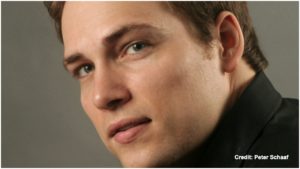
Triple Threat – Tenor Alek Shrader On Finding New Paths for His Career
The Tenor Talks About His Process For Directing ‘Dido & Aeneas’ With Mezzo-Soprano Daniel Mack
By David SalazarOnce a singer stops performing, he or she may often move into teaching or directing. Some singers add either to their schedules as a contrast to their stage performances, though this often represents a decline in being the star attraction onstage.
But Alek Shrader is doing it all at the same time while still very much in his vocal prime. The tenor, one of the stars of the documentary “The Audition” and winner of the Met Opera’s competition, has made his mark as a top lyric tenor over the past decade, but now he is moving into a phase of his life where he wants to experiment with his artistry.
“It is still a very big experiment and I am making it up as I go in a way,” the tenor told OperaWire in a recent interview. “What it comes down to is that I want to do projects that are interesting to me instead of filling up my schedule with gigs.”
One of the major motivations for this change is his four-year-old daughter with mezzo-soprano Daniela Mack.
“Being on the road 12 months of the year is not what I want anymore. I am experimenting to see if I can spend more time at home and still be able to do things that seem interesting to me.”
Part of that transition for the tenor was taking a post at the University of Notre Dame, where he is an Assistant Professor of Voice and the Artistic Director of the Opera program.
“I love to perform, but I’ve always wanted to have more ownership of the story in terms of directing and writing. So there’s no time like the present.”
And at the present, he is preparing his directorial debut with Death of Classical in a production of “Dido and Aeneas.”
A New Vision
The production came about during a casual conversation between Mack and Andrew Ousley, the founder of Death of Classical and Mack’s publicist with Unison Media. Ousley noted that he was interested in presenting the famed Purcell opera at some point in the future and Mack, despite not performing the complete role before, volunteered to take it on.
At that point, Shrader inquired about the director position for the production and pitched his vision for the work; he had recently directed it at Notre Dame, so he had familiarity with the opera. Ousley was won over.
“I am totally on the coattails of Daniela,” Shrader joked. “I am hungry for any opportunity and I was fortunate and grateful to get a chance to do something like this.”
Shrader’s concept was to flesh out the drama by inserting parts of Christopher Marlowe’s famed play on the same subject. This approach restored characters to the production, but also tasked the artistic collaborators with taking on more than they might be used to with this opera. Many of them would have to learn additional text.
“I think it’s more interesting than the Purcell,” Shrader noted, adding that he was always interested in seeing how to expand on texts of works when interpreting them.
He professed to being greatly influenced by Christopher and David Alden, both of whom he has worked with before. During his interactions with the directors, he has learned to explore the hints and clues that text give in order to further their potential directions and visions. He noted that in his experience, baroque operas, particularly those of Handel, lend themselves better to this kind of treatment.
“I was in a gorilla suit for a production of ‘Alcina,’” he noted. “It’s not in the text, but it could be. There is enough evidence in the text to go in that direction.”
And for that reason, he opted for bringing in Marlowe’s text, which not only influences the overall structure of the piece, but also enhances the work’s most iconic moment – Dido’s Lament.
“Dido’s Lament is the reason to do this opera. It remains, after centuries, one of the greatest pieces of music ever created,” Shrader noted. “If you’ve read the Marlowe play, you know how we enhanced this particular passage.”

Jokes & Game of Thrones
The creation of the production has been an experience full of unique challenges for Shrader.
He has embarked on a new collaborative chapter in his relationship with Mack. The couple has performed extensively onstage (and will perform in “Semele” at Opera Philadelphia” later this fall), but this was their first collaboration as artist and director.
“This new spin on our relationship has been very easy. I think she is very proud of the work we have done and the character we have discovered.”
He’s enjoyed that with the other performers as well, seeing them take ownership of the ideas he proposes and making them their own.
“We are all thinking the same thoughts and can collaborate and improvise together,” he added. “I show up with an idea and a concept and just through conversation and rehearsal, pass ownership to them. And then I can just watch it grow.”
He noted that he has also been able to develop a relaxed way of directing, which involves making jokes and using cultural references to create a common vocabulary.
“Something that was happening while we were beginning staging was the end of Game of Thrones,” he revealed. “So I say ‘Khal Drogo’ or ‘Cersei’ and they know what I am talking about. And that gives us immediate common references that we can work with.”
Narrowing & Deepening The Vision
But Shrader has also had to find a great deal of flexibility with regards to his vision. The production will be performed at the Green-Wood Cemetery in Brooklyn, a space that is rather deep, though narrow.
Shrader had not seen it until a few weeks before beginning rehearsals, forcing him to rethink his initial design.
“The space is the attraction, but it does have some problems. It is more like a concert version that is narrow and deep. That was our first hurdle in staging everything,” he emphasized.
He also noted that the space’s limitations extended to how artists could prepare their daily routines. In most theaters, singers have spaces to prepare costumes, make up, and even to warm up. They have a green room and other locales to get themselves comfortable before a performance. But the cemetery did not offer that, adding another unique layer of adjustments and preparation.
But Shrader noted that this experience has just made the show all the more malleable in some ways and even knows how they could go on tour with it.
“I think it would play well on an airplane. That’s how we would tour. The show would be on the plane and we would just go from city to city.”


